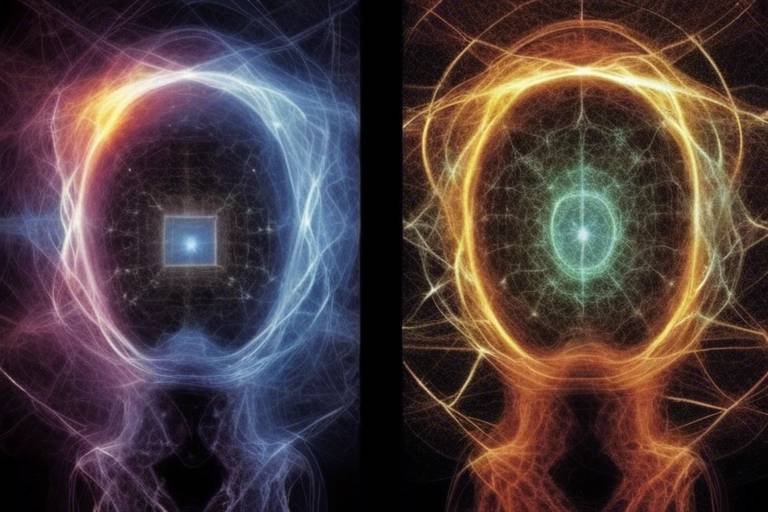Understanding the Relationship between Ontology and Epistemology
Have you ever paused to ponder the very nature of existence and knowledge? It's a fascinating rabbit hole, isn't it? The relationship between ontology and epistemology is like a dance, where each partner influences the other's moves. Ontology, the study of being and existence, lays the groundwork for how we perceive reality. In contrast, epistemology dives into the waters of knowledge and belief, exploring how we come to know what we know. Together, they form a complex web that shapes our understanding of the world around us.
Imagine ontology as the foundation of a house. Without a solid base, the structure above it—our knowledge—would crumble. This foundational aspect of ontology helps us categorize existence into various entities, whether they be physical objects, abstract concepts, or even emotions. It's all about asking the big questions: What is real? What does it mean to exist? These questions set the stage for epistemology, which then asks: How do we know what is real? What justifies our beliefs?
The interplay between these two philosophical domains is not just academic; it has real-world implications. For instance, consider how different cultures approach existence and knowledge. In some cultures, knowledge is seen as a communal asset, while in others, it is viewed as an individual pursuit. This cultural lens influences both ontological and epistemological perspectives, leading to a rich tapestry of philosophical thought.
To illustrate this relationship further, let’s look at how different philosophical traditions shape our understanding:
| Philosophical Tradition | Ontology | Epistemology |
|---|---|---|
| Western Philosophy | Realism, Materialism | Empiricism, Rationalism |
| Eastern Philosophy | Idealism, Holism | Intuitionism, Relativism |
As we delve deeper into the nuances of ontology and epistemology, we uncover that our understanding of knowledge is profoundly influenced by our beliefs about existence. For example, a materialist perspective might lead one to prioritize empirical evidence as the primary source of knowledge, while an idealist might argue that our perceptions shape reality itself. This divergence in thought illustrates how ontology and epistemology are not just separate entities; they are intertwined in a continuous dialogue.
In summary, grasping the relationship between ontology and epistemology is crucial for a holistic understanding of reality. By exploring how our beliefs about existence shape our knowledge acquisition, we can better appreciate the complexities of both philosophical domains. So, the next time you find yourself questioning the nature of reality or the validity of your knowledge, remember that these inquiries are part of a larger philosophical dance—a dance that has been ongoing for centuries.
- What is ontology? Ontology is the philosophical study of being and existence, focusing on the nature of reality and categories of existence.
- What is epistemology? Epistemology is the study of knowledge and belief, examining how we acquire knowledge and the justification for our beliefs.
- How do ontology and epistemology relate to each other? Ontology provides the foundation for understanding existence, while epistemology explores how we come to know and justify our beliefs about that existence.
- Why is this relationship important? Understanding the interplay between ontology and epistemology helps us grasp the complexities of knowledge and existence, influencing various fields such as science, ethics, and cultural studies.

Defining Ontology
Ontology is a fascinating branch of philosophy that dives deep into the questions of being and existence. At its core, ontology seeks to answer fundamental questions about what things exist in the universe and how these entities can be categorized. Imagine walking through a vast library where every book represents a different aspect of existence; ontology is like the cataloging system that helps you understand where each book fits in the grand scheme of things.
To better grasp ontology, it’s essential to explore its key concepts, which include:
- Categories of Existence: Ontology classifies entities into various categories, such as physical objects, abstract concepts, and even events. This classification helps us comprehend the diversity of existence.
- The Nature of Reality: Ontology also investigates the nature of reality itself. Is reality something that exists independently of our perception, or is it shaped by our experiences and thoughts?
- Relations Between Entities: Understanding how different entities relate to one another is crucial in ontology. For instance, how do ideas interact with physical objects?
By examining these concepts, we can establish a foundational understanding of ontology that is critical for exploring its relationship with epistemology. For instance, if we categorize existence in a certain way, it inevitably influences how we acquire knowledge about those entities. Think of it like a gardener tending to a garden; the way the plants are arranged (ontology) will affect how the gardener (epistemologist) interacts with them.
In the realm of ontology, several philosophical perspectives emerge, each offering unique insights into the nature of existence. For example, realism posits that objects exist independently of our perception, while idealism suggests that reality is mentally constructed. These differing views not only shape our understanding of existence but also influence how we approach knowledge acquisition.
In summary, ontology serves as the backbone of philosophical inquiry into existence. It lays the groundwork for understanding how we perceive the world around us and how that perception shapes our knowledge. As we delve deeper into the interplay between ontology and epistemology, we will uncover the intricate connections that define our understanding of reality.

Defining Epistemology
Epistemology, at its core, is the philosophical study of knowledge and belief. It seeks to unravel the complexities of how we know what we know and what it means to claim knowledge. Think of it as the detective of philosophy, piecing together clues about the nature of knowledge and the processes through which we acquire it. It raises fundamental questions: What constitutes knowledge? How do we justify our beliefs? And can we truly know anything at all?
To dive deeper, epistemology can be broken down into several key principles:
- Sources of Knowledge: This refers to where knowledge originates. Common sources include perception, reason, memory, and testimony. Each source has its strengths and weaknesses, leading to debates about their reliability.
- Justification: Justification is crucial in epistemology. It’s not enough to say you know something; you must also provide reasons or evidence for that knowledge. This leads to discussions about what counts as sufficient justification.
- Skepticism: This principle questions the possibility of certainty in knowledge. Skeptics challenge the validity of our beliefs, prompting us to scrutinize our understanding and the grounds upon which we claim to know something.
In essence, epistemology serves as a framework for understanding how we construct knowledge and the validity of our beliefs. It intertwines with ontology, as our beliefs about existence and reality influence our epistemological views. For instance, if one believes that only physical objects exist (a materialist perspective), their approach to knowledge will differ significantly from someone who believes in a realm of ideas or spiritual entities (an idealist perspective).
Moreover, epistemology is not static; it evolves with cultural and historical contexts. Different philosophical traditions offer varying insights into the nature of knowledge. For example, Western epistemology often emphasizes individual rationality and empirical evidence, while Eastern traditions may incorporate a more holistic approach, valuing intuition and collective wisdom.
Ultimately, understanding epistemology is essential for navigating the vast sea of information in our modern world. In a time when misinformation can spread like wildfire, having a solid grasp of how we acquire and justify knowledge becomes increasingly vital. It allows us to discern credible sources from unreliable ones and fosters critical thinking skills that are indispensable in today’s society.

The Nature of Reality
When we dive into the concept of reality, it's like peeling back the layers of an onion; each layer reveals something new about our existence and the world around us. Reality is not just a simple backdrop for our lives; it is a complex tapestry woven from various threads of perception, belief, and understanding. Philosophers have long debated what constitutes reality, and their explorations have led to a rich array of perspectives that help us grasp the essence of existence.
At its core, reality can be understood through different philosophical lenses, each offering unique insights into what we perceive as "real." For instance, realism posits that reality exists independently of our thoughts and beliefs. It suggests that there is a world out there, full of objects and events, regardless of whether we are aware of them or not. On the other hand, idealism argues that reality is fundamentally shaped by our perceptions and consciousness. In this view, the physical world is seen as a construct of the mind, leading to a more subjective understanding of existence.
To illustrate this interplay, consider the following table that contrasts these two perspectives:
| Aspect | Realism | Idealism |
|---|---|---|
| Nature of Reality | Objective and independent of human thought | Subjective and dependent on perception |
| Knowledge Acquisition | Knowledge is discovered through observation | Knowledge is constructed through experiences |
| Truth | Truth exists outside of individual beliefs | Truth is shaped by individual interpretations |
This dichotomy prompts a fascinating question: How does our understanding of reality influence what we consider to be knowledge? For instance, if we adopt a realist perspective, we might lean towards empirical methods of inquiry, relying on observation and experimentation to uncover truths about the world. Conversely, an idealist approach may lead us to explore the subjective experiences that shape our understanding, emphasizing the importance of context and interpretation.
Moreover, the nature of reality is not just a philosophical debate; it has real-world implications. Take, for example, the ongoing discussions in the fields of science and psychology. Scientists often operate under the assumption that there is an objective reality that can be measured and tested. However, psychologists may argue that our mental states and perceptions significantly influence how we interpret that reality. This interplay creates a rich ground for inquiry and debate, pushing us to consider the limitations of our knowledge and the frameworks we use to construct it.
In essence, the nature of reality is a dynamic and evolving concept, shaped by our ontological beliefs and epistemological frameworks. As we continue to explore these ideas, we find ourselves in a perpetual dance between what exists and what we can know. This relationship not only enriches our understanding of existence but also challenges us to question the very foundations of our beliefs and knowledge.
- What is ontology? Ontology is the philosophical study of being and existence, focusing on the categories of existence and the nature of reality.
- What is epistemology? Epistemology is the study of knowledge and belief, examining how knowledge is acquired, justified, and understood.
- How do ontology and epistemology relate to each other? Ontology and epistemology are interconnected; our understanding of what exists influences how we acquire knowledge, and vice versa.
- Why is the nature of reality important? Understanding the nature of reality helps us navigate our beliefs and knowledge, shaping our worldview and influencing our actions.

Realism vs. Idealism
The debate between realism and idealism is a cornerstone of philosophical inquiry, shaping our understanding of existence and knowledge. At its core, realism posits that the world exists independently of our perceptions. Think of it as a sturdy tree standing tall in a forest, regardless of whether anyone is there to admire its beauty. Realists argue that reality is objective and can be understood through observation and empirical evidence. They believe that facts exist out there, waiting to be discovered, much like hidden treasures buried beneath the earth.
On the flip side, idealism suggests that reality is fundamentally shaped by our perceptions and thoughts. Imagine a painter creating a masterpiece; the canvas is blank until the artist applies their brush. Idealists contend that the mind plays a pivotal role in constructing reality, meaning that what we perceive is not merely a reflection of the external world but rather a product of our consciousness. This perspective raises intriguing questions: If our thoughts shape reality, how can we ever truly know what exists outside of our minds?
To further illustrate the contrast between these two views, consider the following table:
| Aspect | Realism | Idealism |
|---|---|---|
| Nature of Reality | Objective and independent of perception | Subjective and dependent on perception |
| Knowledge Acquisition | Through observation and empirical evidence | Through introspection and mental constructs |
| Truth | Absolute and discoverable | Relative and constructed |
This dichotomy not only influences our philosophical perspectives but also impacts our epistemological approaches. For instance, a realist might advocate for the scientific method as the best way to acquire knowledge, asserting that through rigorous testing and observation, we can uncover the truths about the universe. In contrast, an idealist may argue that knowledge is best understood through personal experience and interpretation, emphasizing the role of context and individual perception.
Ultimately, the tension between realism and idealism invites us to reflect on our own beliefs about existence and knowledge. Are we more inclined to believe in an objective reality that exists independently of us, or do we lean towards the idea that our understanding shapes the world around us? This philosophical inquiry is not just an academic exercise; it influences how we approach everything from science to art, ethics, and beyond.
- What is realism? Realism is the philosophical viewpoint that asserts the existence of an objective reality independent of our perceptions.
- What is idealism? Idealism posits that reality is fundamentally shaped by our thoughts and perceptions, suggesting that our minds play a crucial role in constructing the world around us.
- How do realism and idealism affect knowledge acquisition? Realism emphasizes empirical evidence and observation, while idealism focuses on personal experience and interpretation.
- Can someone be both a realist and an idealist? Yes, some philosophers adopt a more nuanced position that incorporates elements of both perspectives, recognizing the complexities of existence and knowledge.

Materialism vs. Dualism
The debate between materialism and dualism is one of the most fascinating discussions in philosophy, particularly when we consider how these ontological perspectives shape our understanding of knowledge and existence. At its core, materialism posits that everything that exists is fundamentally physical. In this view, reality is composed of matter, and consciousness, thoughts, and emotions are merely products of physical processes. Imagine a computer: it operates based on hardware and software, and any output is a direct result of its programming and physical components. Similarly, materialists argue that human consciousness arises solely from the interactions of neurons and biochemical processes in the brain.
On the other hand, dualism presents a contrasting perspective. This philosophy asserts that there are two distinct kinds of substances: the mental and the physical. Dualists argue that while our bodies are material, our minds or souls exist in a separate realm. To illustrate, think of dualism like a television and the show it broadcasts. The television (the physical body) is tangible and can be touched, but the show (the mind or consciousness) is an abstract experience that cannot be physically grasped. This separation raises profound questions about the nature of consciousness and its relationship to the physical world.
The implications of these two positions extend beyond mere academic debate; they influence how we approach questions of knowledge and existence. For instance, if one subscribes to materialism, the pursuit of knowledge is often grounded in scientific inquiry and empirical evidence. In contrast, dualists may argue for the importance of subjective experiences and introspection, suggesting that knowledge is not limited to what can be physically measured.
To further explore the distinctions between materialism and dualism, consider the following table that summarizes their key characteristics:
| Aspect | Materialism | Dualism |
|---|---|---|
| Nature of Reality | Only physical matter exists. | Both physical and non-physical substances exist. |
| View on Consciousness | Consciousness is a byproduct of material processes. | Consciousness is a separate entity from the physical body. |
| Knowledge Acquisition | Empirical evidence and scientific methods are paramount. | Subjective experiences and introspection are essential. |
| Philosophical Implications | Leads to a more mechanistic understanding of existence. | Encourages exploration of metaphysical questions. |
Ultimately, the materialism vs. dualism debate invites us to ponder profound questions about who we are and how we perceive the world around us. Are we merely complex machines, or is there something more to our existence that transcends the physical? This philosophical inquiry not only shapes our understanding of knowledge but also influences various fields, including psychology, neuroscience, and even artificial intelligence. As we navigate these complex ideas, it becomes clear that our ontological beliefs significantly impact our epistemological frameworks, guiding how we interpret reality and our place within it.
- What is materialism? Materialism is the philosophical view that everything that exists is made of physical matter, and all phenomena, including consciousness, can be explained through physical processes.
- What is dualism? Dualism is the belief that there are two distinct types of substances: the mental (mind, soul) and the physical (body), suggesting that consciousness exists separately from the physical body.
- How do materialism and dualism affect knowledge acquisition? Materialism emphasizes empirical evidence and scientific methods, while dualism values subjective experiences and introspection in the pursuit of knowledge.
- Can materialism and dualism coexist? While they are fundamentally different, some argue for a more integrated approach that acknowledges the value of both perspectives in understanding existence and knowledge.

The Interplay of Knowledge and Existence
The relationship between knowledge and existence is a fascinating dance, one that reveals the intricate ways in which our understanding of reality shapes what we know. Imagine for a moment that knowledge is like a lens through which we view the world; the clearer the lens, the more we can discern the details of existence. This interplay is not just a philosophical abstraction; it has real-world implications that affect how we engage with our surroundings and make sense of our experiences.
At its core, this relationship suggests that our ontological beliefs—the assumptions we hold about what exists—directly influence our epistemological frameworks, or how we come to know what we know. For instance, if one believes in a materialist ontology, they may prioritize empirical evidence and scientific inquiry as the primary sources of knowledge. Conversely, someone who subscribes to an idealist view might lean towards introspection and subjective experience as valid means of understanding reality. This divergence illustrates how our foundational beliefs about existence can shape our pursuit of knowledge.
Moreover, the interplay between knowledge and existence can be seen in various contexts, such as science, philosophy, and everyday life. Consider the scientific method: it relies on the assumption that an objective reality exists, which can be observed, tested, and understood through systematic inquiry. If scientists were to adopt a radically different ontological stance—say, one that denies the existence of an external reality—the very foundation of scientific knowledge would be undermined. In this way, our beliefs about existence not only inform our knowledge acquisition methods but also determine the legitimacy of the knowledge we produce.
Additionally, this relationship can lead to a cycle of reinforcement. As we acquire knowledge, it can influence our ontological beliefs. For example, groundbreaking discoveries in quantum physics have challenged traditional notions of reality, leading some to reconsider their views on existence itself. This reciprocal influence highlights a dynamic interplay where knowledge and existence are in a constant state of negotiation, each shaping and reshaping the other.
To further illustrate this interplay, let's look at a simple table that highlights how different ontological perspectives can lead to distinct epistemological approaches:
| Ontological Perspective | Epistemological Approach |
|---|---|
| Realism | Empirical observation, scientific method |
| Idealism | Introspection, subjective experience |
| Materialism | Focus on physical evidence, skepticism of non-material claims |
| Dualism | Exploration of both physical and mental realms, interdisciplinary methods |
As we navigate our lives, the interplay of knowledge and existence becomes even more pronounced. Our cultural backgrounds, personal experiences, and even emotional states can color our perceptions of reality and, consequently, our understanding of knowledge. This interplay is not static; it evolves as we encounter new experiences and information, leading to a richer, more nuanced understanding of both existence and knowledge.
In conclusion, the relationship between knowledge and existence is a profound one that has implications for how we understand the world around us. Recognizing this interplay allows us to not only appreciate the complexity of our beliefs but also encourages us to remain open to new ideas and perspectives. After all, in the grand tapestry of existence, every thread of knowledge contributes to a more vibrant and comprehensive picture of reality.
- What is the difference between ontology and epistemology? Ontology is the study of being and existence, while epistemology is the study of knowledge and belief.
- How do cultural perspectives influence our understanding of knowledge? Cultural backgrounds shape our beliefs and values, which in turn affect how we acquire and interpret knowledge.
- Can knowledge change our understanding of existence? Yes, new discoveries and experiences can challenge and reshape our ontological beliefs.
- Why is it important to understand the relationship between knowledge and existence? Understanding this relationship enhances our comprehension of reality and encourages a more integrated philosophical approach.

Influence of Cultural Context
The world we live in is a vibrant tapestry of cultures, each weaving its own unique threads of thought, belief, and understanding. When we talk about ontology and epistemology, we cannot ignore the profound impact that cultural context has on these philosophical domains. Just as a painter uses different colors to create a masterpiece, cultures use their historical experiences, languages, and traditions to shape their views on existence and knowledge. This cultural influence not only colors our perceptions but also molds the very foundations of how we comprehend reality.
For instance, in many Western cultures, the focus tends to be on individualism and objective reality. This cultural backdrop fosters a belief in a singular, observable truth that can be known through scientific inquiry and rational thought. In contrast, Eastern cultures often emphasize collectivism and relational understanding, leading to a more holistic view of existence that embraces subjective experiences and multiple truths. This divergence in cultural perspectives creates a rich dialogue between different ontological and epistemological frameworks, allowing for a more nuanced understanding of reality.
Moreover, the ways in which cultures approach knowledge acquisition can vary significantly. In some cultures, knowledge is seen as a communal asset passed down through generations, emphasizing oral traditions and storytelling. In others, knowledge may be viewed as something to be pursued individually, often through formal education and empirical research. This distinction can be illustrated in the following table:
| Cultural Context | Ontology | Epistemology |
|---|---|---|
| Western | Objective reality, individualism | Empirical, scientific inquiry |
| Eastern | Relational reality, collectivism | Holistic, experiential knowledge |
This interplay between culture, ontology, and epistemology not only enriches our philosophical discourse but also has practical implications. For example, understanding these cultural differences can enhance cross-cultural communication and collaboration, especially in globalized contexts where diverse perspectives converge. Recognizing that what one culture considers knowledge might be viewed differently in another can foster greater empathy and understanding.
In summary, the influence of cultural context on ontology and epistemology is profound and multifaceted. It shapes not only how we perceive existence but also how we acquire and validate knowledge. As we navigate through our increasingly interconnected world, appreciating these cultural nuances becomes essential for a deeper understanding of ourselves and others.
- What is the difference between ontology and epistemology?
Ontology deals with the nature of being and existence, while epistemology focuses on the nature and scope of knowledge and belief. - How does culture influence philosophical thought?
Cultural contexts shape our beliefs and understandings, affecting both our views on existence and our methods of acquiring knowledge. - Why is it important to understand the interplay of ontology and epistemology?
Understanding this relationship enhances our comprehension of knowledge and existence, leading to a more integrated approach to philosophy.

Western vs. Eastern Philosophies
When diving into the rich tapestry of philosophical thought, the contrast between Western and Eastern philosophies is both fascinating and illuminating. At the heart of this comparison lies the fundamental differences in how each tradition approaches the concepts of existence and knowledge. In the West, influenced heavily by figures like Plato and Descartes, the focus tends to be on the individual and the objective nature of reality. This perspective often emphasizes rationality and logic as the primary means of understanding the world. For instance, Western philosophers frequently engage in debates about the existence of an objective reality that can be known through empirical observation and logical reasoning.
On the other hand, Eastern philosophies, represented by traditions such as Buddhism and Taoism, often embrace a more holistic view of existence. Here, the interconnectedness of all things is a central theme. Instead of viewing knowledge as something to be acquired, Eastern thought often sees it as a realization of one's place within the cosmos. This perspective leads to a different understanding of knowledge acquisition, where intuition and experiential understanding play crucial roles. For example, in Buddhism, the journey to enlightenment is less about accumulating knowledge and more about transcending the self and understanding the nature of reality through meditation and mindfulness.
To illustrate these differences more clearly, consider the following table that highlights key distinctions:
| Aspect | Western Philosophy | Eastern Philosophy |
|---|---|---|
| Focus | Individualism and rationality | Holism and interconnectedness |
| Knowledge Acquisition | Empirical observation and logic | Intuition and experiential understanding |
| Nature of Reality | Objective and independent | Subjective and interdependent |
| Methodology | Analytical and systematic | Intuitive and contemplative |
Furthermore, the implications of these differing approaches extend beyond mere academic debate. They influence how societies understand ethics, governance, and even science. For instance, in Western societies, the emphasis on individual rights and empirical science has shaped democratic governance and technological advancement. Conversely, Eastern philosophies often promote communal values and harmony with nature, which can lead to different societal structures and ways of living.
In conclusion, understanding the distinctions between Western and Eastern philosophies not only enriches our comprehension of ontology and epistemology but also highlights the diverse ways humans seek to make sense of their existence. By appreciating these varying perspectives, we can foster a more inclusive dialogue about knowledge and reality, bridging the gap between two rich traditions of thought.
- What is the main difference between Western and Eastern philosophies? Western philosophy tends to focus on individualism and rationality, while Eastern philosophy emphasizes holism and interconnectedness.
- How do these philosophies influence knowledge acquisition? Western thought often relies on empirical observation and logic, whereas Eastern traditions value intuition and experiential understanding.
- Can these philosophical approaches coexist? Yes, many modern thinkers seek to integrate insights from both traditions to create a more comprehensive understanding of existence and knowledge.

Implications for Scientific Inquiry
Understanding the intricate relationship between ontology and epistemology is crucial for scientific inquiry, as it shapes the very foundation of how we approach knowledge and existence within the realm of science. At its core, ontology deals with the nature of reality—what exists—and epistemology concerns itself with how we come to know and understand that reality. This interplay can significantly influence scientific methodologies and the interpretation of empirical data.
For instance, consider the implications of different ontological positions on scientific research. If a scientist adopts a realist perspective, they may operate under the assumption that an objective reality exists independently of human perception. This belief can lead to a more traditional approach to scientific inquiry, emphasizing observation, experimentation, and the pursuit of universal laws. Conversely, an idealistic viewpoint might suggest that reality is shaped by our perceptions and experiences, prompting researchers to explore subjective dimensions of knowledge and how they influence scientific outcomes.
The relationship between ontology and epistemology also affects the methodologies employed in scientific research. For example, a materialist ontology—which posits that only physical substances exist—may lead to a preference for quantitative research methods that focus on measurable data. In contrast, a dualist ontology that acknowledges both physical and non-physical realities might encourage a more qualitative approach, exploring phenomena like consciousness or subjective experience. This divergence in methodologies is illustrated in the following table:
| Ontology Type | Preferred Methodology | Focus of Inquiry |
|---|---|---|
| Realism | Quantitative | Objective laws and universal truths |
| Idealism | Qualitative | Subjective experiences and perceptions |
| Materialism | Quantitative | Physical substances and measurable phenomena |
| Dualism | Mixed Methods | Mind-body interactions and consciousness |
Furthermore, the implications of ontology and epistemology extend to how scientific findings are interpreted. For instance, if researchers approach their data from a skeptical epistemological stance, they may question the validity of their results, leading to a more rigorous analysis and potentially more robust conclusions. On the other hand, a more dogmatic epistemological approach might result in accepting findings at face value, which could stifle further inquiry and critical examination.
Ultimately, the interplay between ontology and epistemology not only informs the methodologies and interpretations within scientific inquiry but also encourages a broader understanding of the complexities involved in knowledge acquisition. By recognizing the philosophical underpinnings of their work, scientists can adopt a more holistic approach that acknowledges the multifaceted nature of reality and our understanding of it.
- What is the difference between ontology and epistemology?
Ontology focuses on the nature of being and existence, while epistemology concerns how we acquire knowledge and what justifies our beliefs. - How does ontology influence scientific research?
Ontological assumptions shape the methodologies used in research and affect how scientists interpret their findings. - Can you give an example of how epistemology impacts scientific inquiry?
A skeptical epistemological stance may lead researchers to critically analyze their data, enhancing the reliability of their conclusions.

Conclusion: Bridging Ontology and Epistemology
In the grand tapestry of philosophy, the relationship between ontology and epistemology serves as a crucial thread that weaves together our understanding of existence and knowledge. By recognizing how our assumptions about what exists influence our approaches to acquiring knowledge, we can foster a more nuanced comprehension of reality. This interplay is not merely academic; it affects how we perceive the world, how we engage with different cultures, and how we approach scientific inquiry.
To truly bridge these two domains, we must first acknowledge that our ontological beliefs—our views on what constitutes reality—shape our epistemological frameworks. For example, if we adopt a realist perspective, we may lean towards empirical methods of knowledge acquisition, emphasizing observation and experimentation. Conversely, an idealistic viewpoint might lead us to prioritize subjective experiences and interpretations, suggesting that knowledge is inherently tied to individual perceptions.
Moreover, the implications of bridging ontology and epistemology extend beyond philosophical discourse. In practical terms, this connection influences how we conduct research, interpret data, and even engage in everyday decision-making. By understanding the underlying ontological assumptions that guide our epistemological inquiries, we can become more critical thinkers, capable of questioning the foundations of our beliefs and knowledge systems.
As we navigate the complexities of existence and knowledge, it becomes evident that fostering dialogue between ontology and epistemology is essential. This dialogue not only enriches our understanding of philosophical concepts but also encourages a more integrated approach to addressing the challenges we face in a rapidly changing world. By embracing this interconnectedness, we can cultivate a deeper appreciation for the diverse perspectives that shape our understanding of reality.
- What is the main difference between ontology and epistemology? Ontology focuses on the nature of being and existence, while epistemology deals with the nature and scope of knowledge and belief.
- How do cultural perspectives influence ontology and epistemology? Different cultures may have varying beliefs about existence and knowledge, leading to diverse philosophical interpretations and approaches.
- Why is it important to understand the relationship between ontology and epistemology? Understanding this relationship helps enhance our comprehension of knowledge and existence, fostering a more integrated philosophical approach.
Frequently Asked Questions
- What is the difference between ontology and epistemology?
Ontology is the study of being and existence, focusing on what entities exist and their nature. Epistemology, on the other hand, deals with knowledge—how we acquire it, what justifies it, and the limits of our understanding. Think of ontology as the map of reality, while epistemology is the compass guiding us through that map.
- How do ontology and epistemology influence each other?
The relationship between ontology and epistemology is reciprocal. Our beliefs about what exists (ontology) shape how we understand and acquire knowledge (epistemology). For example, if one believes that only physical objects exist, their approach to knowledge will likely focus on empirical evidence and scientific methods.
- Can you give an example of realism and idealism?
Sure! Realism posits that objects exist independently of our perception—like a tree standing in a forest, whether or not anyone is there to see it. Idealism, however, suggests that reality is mentally constructed; in this view, that same tree only exists in the mind of the observer. This fundamental difference affects how each perspective approaches knowledge and truth.
- What are materialism and dualism?
Materialism asserts that only physical matter is real, meaning everything can be explained through physical processes. Dualism, in contrast, argues that both physical and non-physical (like the mind or soul) exist. This debate impacts how we understand consciousness and the nature of reality, influencing various fields, including psychology and philosophy.
- How does culture influence our understanding of ontology and epistemology?
Cultural contexts shape our beliefs about existence and knowledge. For instance, Western philosophies often emphasize individualism and objective reality, while Eastern philosophies might focus on interconnectedness and subjective experiences. This diversity leads to varying interpretations of what it means to know something or what truly exists.
- Why is the relationship between ontology and epistemology important for scientific inquiry?
Understanding how ontology and epistemology interact can profoundly influence scientific research. It helps researchers choose appropriate methodologies and interpret data within a theoretical framework. For example, if a scientist believes that only observable phenomena are real, their approach to conducting experiments will differ significantly from someone who considers abstract concepts equally valid.



















